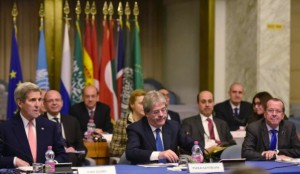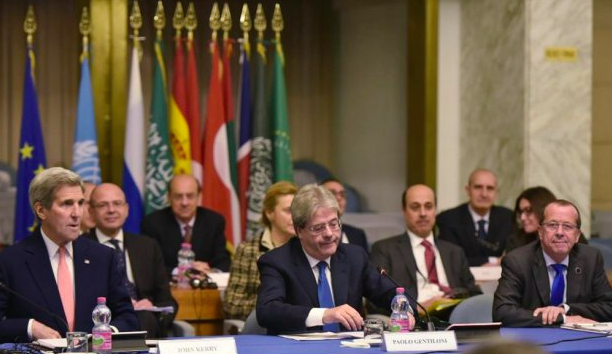By Libya Herald reporters.

Tunis, 2 February 2016:
There appeared to be a marked change of mood music in Rome today where 23 . . .[restrict]foreign ministers of countries in the coalition against IS met to discuss Libya and well as the current airstrike-dominated campaign in Syria and Iraq.
Last week’s sabre-rattling from the US, Italy and the UK was no longer in evidence. General Joseph F. Durnford, chairman of the US Joint Chiefs of Staff had briefed that an international assault against IS in Libya was a question of weeks, though not hours. US Defence Secretary Clark had admitted that American special forces had been on the ground looking for militia allies against IS. British media reported UK defence sources as considering committing 1,000 troops in an unspecified capacity.
British Foreign Secretary Philip Hammond however denied yesterday that the UK had plans to commit combat troops but would give “strategic and intelligence” support to the new Libyan government. Nor was there any mention of Italian defence minister Roberta Pinotti’s suggestion that the international community might act without Libyan authorisation in the case of “an emergency”.
Instead both US Secretary of State, John Kerry, his Italian opposite number Paolo Gentiloni and the other foreign ministers all focused on the urgent need for the formation of the Government of National Accord and its approval by the House of Representatives.
There was no public reference to the need for the Tobruk parliament to change the Constitutional Declaration nor accept the controversial Article 8 of the Libyan Political Accord. This would transfer control of the armed forces, the Central Bank, the National Oil Corporation and the Libyan Investment Authority to the new Presidential Council headed by Faiez Serraj.
Kerry said that this morning and over lunch, the foreign ministers had discussed the need for the new government to be put together and the names submitted by the HoR on Monday or Tuesday. In his part of the press conference Gentiloni spoke of ten days to two weeks before the parliament might vote.
“And that possible approval might be a turning point for the international community” continued Kerry, “because the international community wants to meet the requests of the National Agreement government in Libya when it comes to security, to the economy and to overall cooperation.” He added that in Rome he had found a great deal of unity on Libya.
The main thrust of the meeting had been to examine the effect of the international campaign against IS in Syria and Iraq. He said the anti-IS coalition assaults had complicated IS’s recruitment of foreign fighters, degraded their ability to plan operations, move personnel and maintain supply lines. “ And that is one of the reasons why you see some people being shuttled out of or escaping out of and going to Libya or some other place” added Kerry.
He made no further reference to reports that senior IS commanders had been appearing in their Sirte stronghold.
He said it had been agreed that critical steps would be taken in the coming days. Working closely with UNSMIL chief Martin Kobler “ We will be meeting in order to try to advance the prospects of support for the government which the Libyans themselves have now chosen, and which is coming through a Libyan effort. That, we hope, is going to occur in the short term and I’m not going to go into the details. But a very specific schedule was agreed with respect to how we can advance the efforts of the Libyan government to move forward”.
[/restrict]








